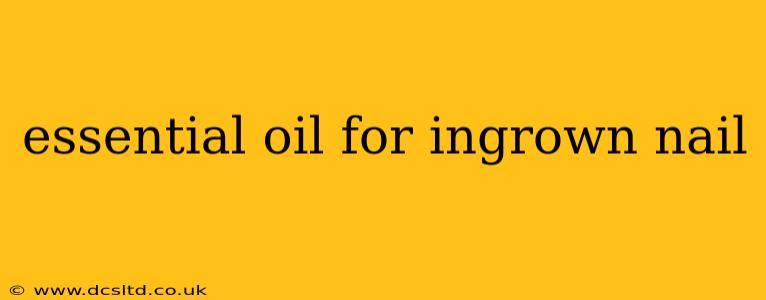Ingrown toenails, a common and often painful condition, occur when the edge of a toenail grows into the surrounding skin. This can lead to inflammation, redness, swelling, and even infection. While medical intervention might be necessary in severe cases, many find relief and prevention through the use of essential oils. This guide explores the potential benefits of certain essential oils, alongside important caveats and preventative measures.
What Essential Oils Can Help with Ingrown Toenails?
Several essential oils possess properties that may alleviate the discomfort and promote healing of ingrown toenails. However, it's crucial to remember that essential oils are not a replacement for professional medical advice. Always consult a doctor or podiatrist, especially if you experience severe pain, infection, or recurring ingrown toenails.
Tea Tree Oil: Known for its potent antimicrobial and anti-inflammatory properties, tea tree oil is often touted as a first-line defense against ingrown toenail infections. Its ability to fight bacteria and reduce swelling makes it a popular choice for topical application.
Lavender Oil: Lavender oil boasts soothing and anti-inflammatory properties. It can help reduce pain and inflammation, creating a more comfortable environment for healing. Its calming scent may also provide psychological relief.
Oregano Oil: Another powerful antimicrobial oil, oregano oil is known for its strong ability to combat bacterial and fungal infections. It can be particularly beneficial if an infection has developed. However, due to its potency, it should be diluted significantly before application.
Eucalyptus Oil: Eucalyptus oil possesses anti-inflammatory and analgesic (pain-relieving) properties. It can help reduce swelling and pain associated with an ingrown toenail.
How to Use Essential Oils for Ingrown Toenails?
Important Note: Essential oils are highly concentrated and should never be applied directly to the skin without dilution. Always dilute them with a carrier oil, such as coconut oil, jojoba oil, or olive oil. A typical ratio is 1-3 drops of essential oil per tablespoon of carrier oil.
- Clean the affected area: Thoroughly wash and dry the affected toe before applying any essential oil blend.
- Dilute the essential oil: Mix your chosen essential oil(s) with a carrier oil.
- Apply the mixture: Gently apply a small amount of the diluted oil to the affected area using a cotton swab or clean finger.
- Massage gently: Massage the oil into the skin around the ingrown nail, avoiding direct contact with the open wound if one exists.
- Repeat as needed: Repeat the application 2-3 times daily, or as needed, until you see improvement.
What are the potential risks of using essential oils for ingrown toenails?
While generally safe when diluted properly, essential oils can cause allergic reactions in some individuals. Always perform a patch test on a small area of skin before applying to the affected toe. If you experience any irritation, redness, or swelling, discontinue use immediately. Essential oils should not be ingested.
Can essential oils prevent ingrown toenails?
While essential oils can help manage the symptoms of an existing ingrown toenail, they are not a guaranteed preventative measure. However, maintaining good foot hygiene, trimming toenails properly, and wearing appropriately fitting shoes are crucial for preventing ingrown toenails.
What should I do if my ingrown toenail is severe?
If you experience severe pain, swelling, redness, pus, or signs of infection (such as fever or chills), seek immediate medical attention. A doctor or podiatrist can provide appropriate treatment, which may include surgical removal of part of the nail.
Are there other home remedies for ingrown toenails?
Besides essential oils, other home remedies may provide temporary relief, such as soaking the affected toe in warm water, applying a warm compress, and keeping the area clean and dry. However, these are not substitutes for professional medical advice if the condition worsens.
This information is for educational purposes only and should not be considered medical advice. Always consult a healthcare professional before using essential oils or other home remedies for medical conditions.
